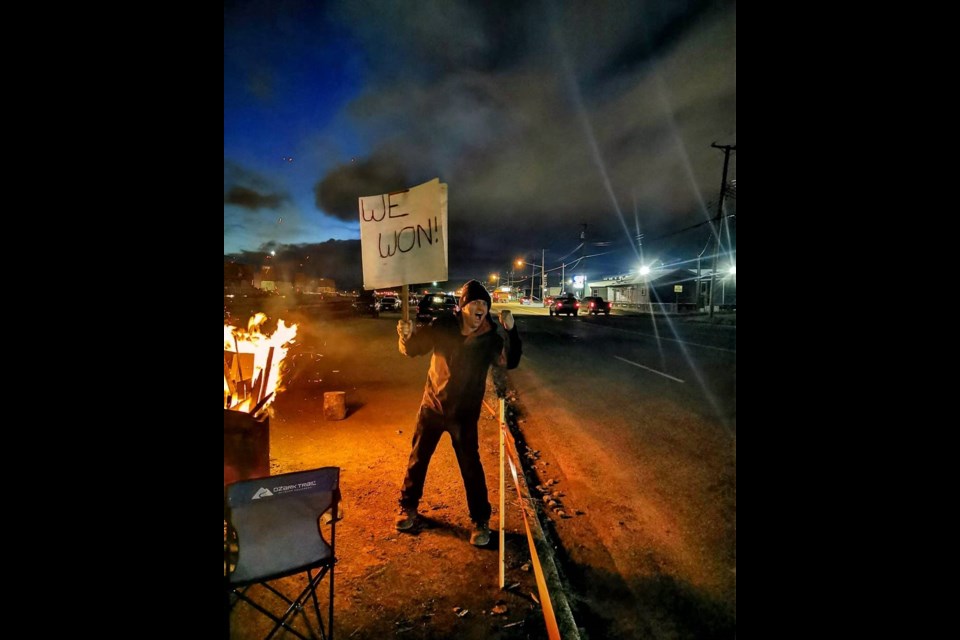The picket lines came down Tuesday morning along the CN Rail tracks on First Avenue and at hundreds more locations across Canada now that a tentative settlement in the labour dispute has been achieved.
Conductor Draven Cruikshanks shovelled away the doused embers of the trash can bonfire that kept him and his co-workers warm for the past seven days, relieved their work stoppage is finally over.
Their strike to secure better working conditions for 3,200 rail workers across Canada resulted in a week’s lost wages but Cruikshanks says it should result in better working conditions and he can’t wait to get back on the job.
“I’m just happy the company finally accepted the union’s contract and we’re able to go back to work,” said Cruikshanks. “Hopefully we got the better rest rules we were looking for.”
Conductor Shawn Hale was on hand to help dismantle the picket and wrap up his last four-hour strike shift and he’s looking forward to moving freight again.
“It’s not fun for everyone, their families are all affected by us not working and now we can get back to our routines and hopefully see some change around here,” said Hale. “We had to make a stand for our collective agreement and that’s the only way it was going to happen was us shutting ‘er down and putting up a stand.”
In Prince George, the strike forced a work stoppage for 109 conductors, trainmen and yard workers who work the east-west line as part of the Teamsters Canada Rail Conference CTY Division 343 and another 76 workers with similar duties who work the north-south line represented by Division 105.
Terms of the tentative deal have yet to be announced. The deal will be presented to the membership for ratification within the next one or two months. The workers were not receiving any strike pay while they were off their jobs.
“It’s good to be going back to work, our negotiating committee has our best interests at heart, obviously, said Jeremy Butterfield, the local chairperson of Division 105. “It’s an agreement they’ve put forward and it has to be good. Everybody’s happy to get back to work, nobody wants a work stoppage especially this close to the holidays.”
Butterfield, who works as a conductor, said an audio recording of a conversation between a CN conductor and a supervisor released publicly on Monday might have helped speed progress of talks between the two sides.
In that conversation, recorded in October 2018 in Pickering, Ont., the supervisor asks a conductor to move a train to a new location where he and the locomotive engineer would be relieved by a new crew. Teamsters Canada said the conductor told the supervisor the crew had already worked a 10-hour shift and needed to be relieved where they were, in Pickering, Ont., rather than move the train to where the supervisor had requested, which would have taken several hours. In the recording the supervisor said: “When you take your call, you need to be set for 12 hours. Personal rest is not a regulatory or safety issue.”
Ultimately, the train did not move and the conductor was suspended for 14 days without pay for disobeying the order.
“I’m hoping it will fix the issues we went out for, improvement of work conditions, and will address the safety concerns brought forward by the Teamsters,” said Butterfield.
“It was never about wages, that’s why we were so tempered in our resolve. There needs to be improvement and I look forward to actually seeing it and voting on it.”
One positive spinoff of the strike was the camaraderie and friendships gained among union brothers and sisters and their families who got together to wave signs at passing motorists and sat under tents to feast on home-cooked meals or donated food from local businesses or other union supporters.
“There was a lot of support from the community in Prince George – lots of good food - and everyone got to meet people we haven’t met who have been working here and everyone’s kind of building teams here now,” said Hale.
“When you’re standing down here in the middle of the night there’s not much more to do than talk to each other.”
They had more donuts and coffee than they needed and donated the leftovers to some of the social agencies to distribute.
“I’m glad they settled it before the cold snap came in,” said Cruikshanks.



